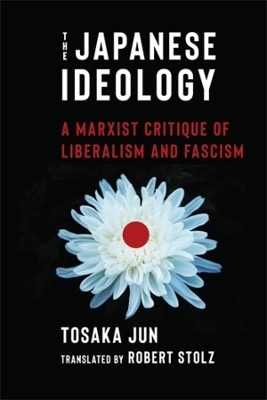
The Japanese Ideology
Columbia University Press (Verlag)
978-0-231-21653-1 (ISBN)
A major Marxist thinker and critic in 1930s Japan, Tosaka Jun was among the world’s most incisive—yet underrecognized—theorists of capitalism, fascism, and ideology during the years before World War II. The Japanese Ideology is his masterpiece, first published in 1935, as Japan and the world plummeted into an age of reaction. Tosaka offers a ruthless philosophical critique of contemporary ideology that exposes liberalism’s deep complicity with fascism.
The Japanese Ideology provides a materialist analysis of the reactionary ideology then overtaking Japan, with profound significance for anywhere fascism has taken root. Modeled after Marx and Engels’s The German Ideology, it critiques idealism as the common ground for liberalism and fascism, against which only historical materialism can suffice. Tosaka demonstrates how liberal and fascist ideas at once justified and concealed Japan’s colonization of East Asia, and he investigates the many traces of fascism in Japanese thought and society. The Japanese Ideology makes an important intervention in Marxist theory by criticizing reliance on the East/West binary and the notion of the “Asiatic mode of production.” Robert Stolz’s translation introduces Anglophone readers to a classic of twentieth-century Marxist thought by an unsung peer of Gramsci and Benjamin with striking relevance today.
Tosaka Jun (1900–45) was a Marxist philosopher of science and cultural critic. He was cofounder and editor of the journal Materialism Studies. Arrested several times in the 1930s, he died in prison on August 9, 1945. Robert Stolz is associate professor of history at the University of Virginia. He is coeditor of Tosaka Jun: A Critical Reader (2014) and author of Bad Water: Nature, Pollution, and Politics in Japan, 1870–1950 (2014).
Introduction, by Richard Stolz
Acknowledgments
Preface (1935)
Preface to the Revised Edition (1936)
Supplemental Preface to the Revised Edition (1937)
Part I: Foundation for a Critique of Japanism
1. Problems in Contemporary Japanese Thought: Japanism, Liberalism, Materialism
2. Foundation for a Critique of Japanism: A Critique of Philological Philosophy
3. An Analysis of “Common Sense”: Toward a Resolution of Two Contradictions in Social Common Sense
4. On Enlightenment: The Meaning and Necessity of Enlightenment Today
5. A Scientific Critique of Culture: An Outline for a Critique of National Purification
6. Japanist Ideology: Japanese Spiritualism, Japanese Agrarian Fundamentalism, Japanese Pan-Asianism
7. Japanese Ethics and Anthropology: An Analysis of the Social Meaning of Watsuji Tetsurō’s Ethics
8. An Analysis of the Restorationist Phenomenon: On the Famialism Analogy
9. The Essence of Cultural Control: An Analysis of Various Aspects of Cultural Control in Contemporary Japan
10. The Fate of Japanism: From Fascism to the Ideology of the Imperial Way
Part II: Foundation for a Critique of Liberalism
11. Modern Idealism in Disguise: Foundation for a Critique of “Hermeneutic Philosophy”
12. “The Logic of Nothingness,” Is It a Logic?: On Nishida’s Philosophical Method
13. The Sorcery of “Totality”: Takahashi Satomi’s Philosophical Method
14. Literature and Philosophy in an Age of Reaction: On the Delusions of “Literaturism”
15. The Essence of “Literary Liberalism”: The Progressive and Reactionary Nature of “Liberals”
16. The Consciousness and Class Theory of the Intelligentsia: Against the So-Called “Class Theory of Intelligence”
17. Doubts on the Theory of the Intelligentsia: Is the Current Problematization of the Intelligentsia Mistaken?
18. The Theory of the Intelligentsia and the Theory of Technology: A Reexamination of the Theory of Technology
19. Liberal Philosophy and Materialism: Against Two Types of Liberal Philosophy
20. Contemporary Japanese Thought: The Superiority of Materialism for the Question of Thought
Part III: The Masses and Socialism in an “Age of Reaction”
21. The Current Meaning of “Progressive” and “Reactionary”
22. A Reconsideration of the Masses
23. Liberalism, Fascism, Socialism
Afterword: A Japanese Ideology for Our Time
Notes
Bibliography
Index
| Erscheinungsdatum | 10.08.2024 |
|---|---|
| Übersetzer | Robert Stolz |
| Verlagsort | New York |
| Sprache | englisch |
| Maße | 152 x 229 mm |
| Themenwelt | Geisteswissenschaften ► Geschichte ► Regional- / Ländergeschichte |
| Sozialwissenschaften ► Politik / Verwaltung ► Politische Systeme | |
| Sozialwissenschaften ► Politik / Verwaltung ► Politische Theorie | |
| ISBN-10 | 0-231-21653-X / 023121653X |
| ISBN-13 | 978-0-231-21653-1 / 9780231216531 |
| Zustand | Neuware |
| Haben Sie eine Frage zum Produkt? |
aus dem Bereich


